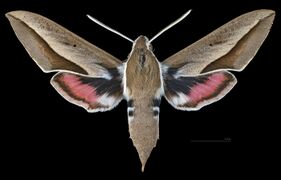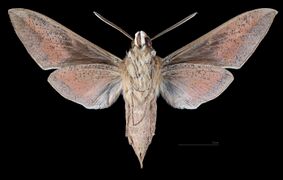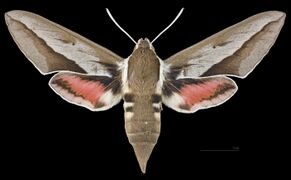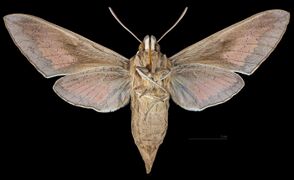Biology:Hyles hippophaes
| Seathorn hawk-moth | |
|---|---|
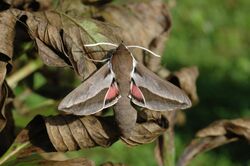
| |
| Scientific classification | |
| Domain: | Eukaryota |
| Kingdom: | Animalia |
| Phylum: | Arthropoda |
| Class: | Insecta |
| Order: | Lepidoptera |
| Family: | Sphingidae |
| Genus: | Hyles |
| Species: | H. hippophaes
|
| Binomial name | |
| Hyles hippophaes (Esper, 1789)[2]
| |
| Synonyms | |
| |
Hyles hippophaes, the seathorn hawk-moth, is a species of moth in the family Sphingidae. The species was first described by Eugenius Johann Christoph Esper in 1789.
Distribution
It is found in Afghanistan, Armenia, Azerbaijan, China , France , Georgia, Germany , Greece, Iran, Iraq, Kazakhstan, Kyrgyzstan, Mongolia, Pakistan , Romania, Serbia and Montenegro, Spain , Switzerland , Syria, Tajikistan, Turkey, Turkmenistan, and Uzbekistan.
Description
The wingspan is 65–80 mm. Subspecies H. h. bienerti is paler and browner than related subspecies. A pale, oblique median line is noticeable on the underside of the forewing. The hindwing patches are more orange than red.
Biology
Larvae of subspecies H. h. bienerti have been recorded on Elaeagnus angustifolia and Hippophae rhamnoides in China and Tajikistan.
Subspecies
- Hyles hippophaes hippophaes
- Hyles hippophaes bienerti (Staudinger, 1874) (from Turkey, the Caucasus and southern Russia, east through Iran, Turkmenistan, Uzbekistan, Tajikistan, Afghanistan to Kashmir and north-western India, and north-east through Kyrgyzstan and eastern Kazakhstan to northern China, Mongolia, Lake Baikal and Tuva in Russia)[3]
- Hyles hippophaes miatleuskii Eitschberger & Saldaitis, 2000 (Kazakhstan)
References
- ↑ World Conservation Monitoring Centre (1996). "Hyles hippophaes". IUCN Red List of Threatened Species 1996: e.T10542A3198676. doi:10.2305/IUCN.UK.1996.RLTS.T10542A3198676.en. https://www.iucnredlist.org/species/10542/3198676. Retrieved 15 November 2021.
- ↑ "CATE Creating a Taxonomic eScience - Sphingidae". Cate-sphingidae.org. Archived from the original on 2012-10-16. https://web.archive.org/web/20121016130024/https://www.cate-sphingidae.org/taxonomy/Hyles/hippophaes.html. Retrieved 2011-10-25.
- ↑ Pittaway, A. R.; Kitching, I. J. (2018). "Hyles hippophaes bienerti (Staudinger, 1874) -- Seabuckthorn hawkmoth". http://tpittaway.tripod.com/china/h_bie.htm. Retrieved December 15, 2018.
Sources
External links
Wikidata ☰ Q601450 entry
 |

